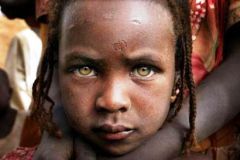AU-sponsored peace talks on Darfur crisis resume in Nigeria
ABUJA, Dec 11 (AFP) — African Union-sponsored peace negotiations on the crisis in the western Sudanese region of Darfur resumed in the Nigerian capital, with delegates from the EU, the League of Arab States, the UN and two main rebel groups in attendance.

|
|
A Sudanese girl is embraced by her sister at Abushouk camp near El Fasher, the capital of North Darfur state, November 23, 2004. (Reuters). |
Representatives of the government of Sudan and the two main armed opposition groups — the Justice and Equality Movement (JEM) and the Sudan Liberation Movement (SLM) — all attended the meeting.
The rebel groups have been represented at the previous two rounds of talks in Abuja with the Khartoum government.
The Nigerian team at the talks is headed by Steve Owolabi, the director of the African Affairs Department of the foreign ministry.
Speaking at the opening of the talks, Sam Ibok, who represented African Union chairman Alpha Oumar Konare said that the meeting’s agenda included a review of recent developments in Darfur as well as a discussion of power- and wealth-sharing in Sudan, security arrangements, demobilisation and reintegration.
“It is our hope that by December 22, we shall conclude our deliberation here in Abuja,” he said.
He reiterated the AU commission’s condemnation of a ceasefire agreement by all the parties to the conflict.
Owolabi, head of the Nigerian team at the talks, expressed his country’s concern over the violation of the peace and ceasefire accords.
“Nigeria is very concerned about the reported new spate of violence that has plagued the Darfur region in the last three weeks. Such an unfortunate development is unlikely to promote peace and reconciliation,” he said.
“This is why we are making a fervent appeal to all the parties to the Darfur conflict to restore calm among the restive elements for the ultimate purpose of restoring durable peace and stability to the area,” Owolabi said.
Signs that negotiations in Abuja would be tough started showing as the parties began accusing each other, immediately after the opening, of accord violations which they said could cripple the talks and the entire peace process.
“We would have a second thinking about the talks if the violations continue at the same level,” SLM spokesman Bahar Ibrahim said shortly after the opening.
“The deployment of troops to areas controlled by JEM could affect the entire process of the talks. Government should withdraw its troops to the area where they were on the day the N’Djamena accord was signed,” the rebel group spokesman Ahmed Tugod said.
Khartoum’s spokesman Majzoub Al-Khalifa Ahmed dismissed the rebels’ demand for a troops withdrawal as “nonsense.”
“This is nonsense that cannot be accepted. We need to deploy more forces in Darfur to open the roads, protect people and assist relief operations,” he stated.
The Abuja talks are aimed at resolving a conflict which is estimated to have killed 70,000 people and driven more than a million from their homes since rebels rose up against the government in February 2003.
Official sources in N’Djamena said Chad had agreed to mediate talks on Saturday between the Sudanese government and a recently identified third rebel group, the National Movement for Reform and Development (NMRD).
The source said that Chad had agreed to mediate at the request of the Sudanese government, after the other two armed opposition groups had refused to include the group in the mainstream talks.
AU mediators refused to grant recognition to NMRD delegates who spent weeks in an Abuja hotel between August and September while the talks were being held.
“The negotiations will not be in parallel to the negotiations in Abuja, but will have the goal of convincing the movement to observe a ceasefire,” Sudanese Foreign Minister Mustafa Osman Ismail has previously said.
A Sudanese government delegation arrived in Chad for talks on Saturday with the NMRD. The delegation, led by Investment Minister Al-Sherif Ahmed Badr and comprising politicians and businessmen from Darfur, would hold an exploratory round of negotiations with the rebel group, semi-official Sudan Media Center said.
Rebels in Darfur rose up against Khartoum 22 months ago, accusing the Arab-led government of marginalising Darfur’s mainly black African population and demanding political autonomy and a greater share of Sudan’s oil wealth.
